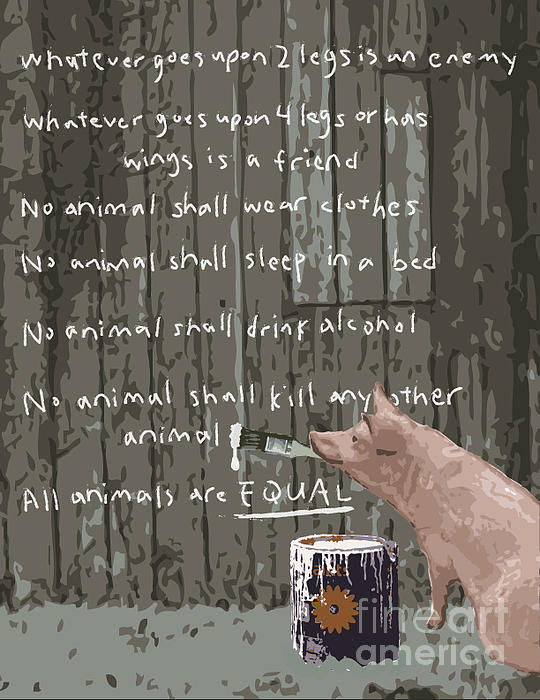 |
| George Orwell (Credit: wikipedia.org) |
Laced with wit,
satire and the underpinnings of allegory, Animal farm by George Orwell espouses
how the fight for freedom can metamorphose into power struggle as a result of
greed and insatiability.
The novel is a
sad, yet true reflection of revolts that have and continue to take place in our
societies. It begins transitions and even ends in a revolt.
Sick and tired
of the treatment meted out to them by their oppressor, the animals in Manor
farm rebel against their master Jones who starves and maltreats them. However,
through his efforts, Major, the oldest and most revered of all the animals
garners the rest of the animals to take their destinies into their own hands.
Their plan to
oust Jones was eventually carried out, although in a rather unplanned manner.
It was on a night they were starved because their master, Mr. Jones had drank
himself to stupor and his other workers simply ignored them(the animals).
Although old
Major did not live to see the revolution, the animals become inspired by his
teachings which included not having anything to do with a two-legged creature,
and rather promote equality among each other.
 |
| The seven commandments |
The principles
opined by old Major are further put into a “complete system of thought”,
comprising seven commandments which they call Animalism and further propagated
by two boars Snowball and Napoleon who become the de-facto leaders due to their
vast knowledge and intelligence. The farm is renamed “Animal farm” and their
lips sing a common song “beasts of England”.
Although an
attempt is made by Mr. Jones to recapture his farm, it is futile .The animals
again win what they call “the battle of the cowshed”.
The animals work
hard and improve their lot. They hold frequent meetings to debate on policies
and discuss tasks for the subsequent days. However, they become torn between
the policy of Snowball to build a windmill to provide electricity and give the
animals more spare time, an idea Napoleon vehemently opposes and summons a pack
of dogs he has been nurturing to chase his opponent(Snowball) out of the farm.
Power-hungry
Napoleon now without any opposition runs the farm with utmost disregard for the
seven commandments. He, together with other pigs sleeps on beds and drinks milk
at the expense of the others. But his
mouth piece Squealer who is described as “a brilliant talker” always defends
the actions of the pigs claiming they (the pigs), “were the brains of the farm,
and should have a quiet place to work in”.
Napoleon views
are dominant. He sets up an oligarchy system where a special committee of pigs
decides for the other animals, while he revises the commandments occasionally
to suit his actions.
Every misfortune
of the farm is attributed to Snowball and even some animals are charged with
conniving with the enemy (snowball) and subsequently murdered. Napoleon begins
to engage with humans and again the animals, who “absorbed anything they were
told”, thus believing the argument made by Squealer that it was all for their
best.
The happenings
in animal farm can be said to be a replica of happenings in many African
nations like Ghana. In the colonial era, the British were the “Mr. Jones” of
the times. Their rule was the dominant one. Indigenes were exploited, gold
dust, exported and a system of dependency on the white ‘masters’ was created
and the nation was in dire need of a ‘Messiah’.
Major’s speech
is a clear example of persuasion and a reiteration of the notion that language
can be used as a weapon and means of manipulation. His act is resonated in the
Ghanaian setting in the era when the struggle for independence from the British
began and Kwame Nkrumah, being the ‘savior’, rallied the populace towards
self-government NOW.
| Dr. Kwame Nkrumah |
Just like Major,
who believed that once the oppressor was defeated, the tyranny would cease and
they would be “managers of their own bodies”, Nkrumah also believed that
gaining independence would make the nation a paradise, because in his own
words, “the black man is capable of managing his own affairs”.
The wind of
change that blows over the now “Animal farm” spreads to neighbouring farms.
When Ghana gained her freedom, other African countries followed suit after all,
in his own words, Kwame Nkrumah posited that “the our independence is
meaningless unless it is linked up with the total liberation of Africa”.
But again, just
like Major, Nkrumah was flawed in thinking that the only enemy was the British.
Subsequent events begin to unfold and the dream of bliss soon becomes one of
complete dystopia.
In the political
arena, songs are used as weapons of propaganda and used to stir the citizens.
In Animal farm, the Song “beast of England” elaborates the disgust the animals
have for the oppressor. Words such as “Shall be ours upon that day”, “For that
day we all must labour”, “Of the golden future time” in the song, are all
indicators of hope and the tireless efforts needed for freedom. The song “Yen
Ara Y’asase Ni” in the Twi parlance is also one that charged the Ghanaian. It
was a reminder of the struggle and need to reach the ‘promise land’.
After the
revolution, the name of the farm was changed from Manor farm, to Animal farm,
and the animals were convinced that their lots would be improved under the new
regime. So was there a name change from Gold coast to Ghana. And as the animals
made their own rules, their seven commandments so did Ghana through the
constitution.
Again,
Snowball’s idea of a windmill was a symbol of electrification and
industrialization so was Nkrumah’s plan evident in the building of the Akosombo
dam, and the construction of many manufacturing companies etc.
| Akosombo Dam |
However, not
long after, Nkrumah was toppled. Although he had his short comings, his
usurpation opened the flood gates for many more and soon the, constitution was
amended over and over and soon, the leaders became known as what Nigerian Poet
P.O.C Umeh describes “Ambassadors of poverty” who are office loafers in the
guise of workers.
| 'Underneath tree for school' |
As is the case
of the pigs sleeping on beds, and swimming in a pool of luxury at the expense
of the others, so were and still are the leaders of this country, who loot
state coffers to enrich themselves while the populace live deplorable lives,
enduring “death traps for roads”, “mud for water,” “candle for light”, and
“underneath trees for schools”.
Similar to the
blame game played by Napoleon (accusing Snowball of any misfortune on the
farm), Governments accuse the opposition of stalling progress in the nation and
vice versa.
A more recent example is when President John Mahama, during his
“changing lives, transforming Ghana” tour in the Volta region, defended the
National Democratic Congress (NDC) government, stating that out of the
14million dollar external debt with which Ghana is currently saddled, the New
Patriotic Party (NPP) incurred 41 percent of the amount.
This was after the
latter’s running mate, Dr. Mahamudu Bawumia accused the Government of the day
of excessive borrowing, asserting that the rate of borrowing by the government
will leave the country with a debt close to GHC100 billion by the end of 2015.


The blame game continues
The character of
Squealer, who was constantly in defense of the pig’s actions, is evident in the
many spokespersons of our leaders. These people serve as alibis of the leaders
swaying some electorate who like the two cart horses, Boxer and Clover, absorb
everything they are told.
 IMF deputy Managing Director Ms. Nemat Shafik & Seth Terkper (www.citifmonline.com) |
Also, Ghana’s
constant arm-stretching attitude to the international community and organizations
like the International Monetary fund leading to them giving directives as to
how the nation should be run ,can be likened to Napoleon’s frequent meetings
with Pilkington, the supposed enemy on two legs and transacting business with
him, a clear betrayal of the vision of absolute independence.
Finally, the
Animal farm is reverted to the old Manor farm, not only in name but in realism
and currently, Ghana appears to be heading towards that path of
self-destruction where her some officials being patriots in reverse order who
with ‘kleptomaniac fingers’, loot public coffers and further aggravate the
situation by constantly soliciting support from the international donors whose
bidding and rules we are forced to comply with.
And although the
name Ghana has not, and will not be changed, the reality is that the nation has
gone back to the earlier days of dependence and slavery in a subtle, yet
powerful manner.



No comments:
Post a Comment